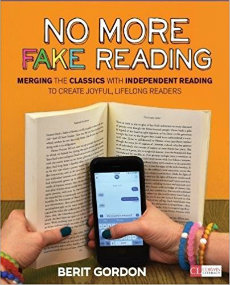No More Fake Reading: Create Joyful Readers
No More Fake Reading: Merging the Classics with Independent Reading to Create Joyful, Lifelong Readers
By Berit Gordon
(Corwin Literacy, 2018 – Learn more)

I must begin this review with a disclaimer or two: First, I teach at a Classical School. We eat, breath, and sleep the classics. Second, I am a die-hard Steinbeck fan, so when this book began with a suggestion about a process that a teacher could use so that the students didn’t actually have to read Of Mice and Men, it would be understatement to say my heart sank a bit. Well, actually, it sank a lot.

However, in the interest of keeping an open mind, I stuck with Berit Gordon to see where she was going with this radical idea, and I am glad that I did.
What Gordon is proposing here is not replacing the classics. She is offering a process for playing catch up with students who have not been reading and therefore do not have the reading skills or the knowledge base to feel anything but overwhelmed and bored when confronted with classic literature.
Gordon offers a step-by-step plan and includes generous resources, from reading lists to possible lesson plans to where and how a teacher can build a classroom library. She gives creative and student friendly ideas on how to update the book report in meaningful ways that both teachers and students will enjoy.
The power of Socratic questioning
Ultimately, her goal is to get students to a point that they are able to engage in Socratic seminars. This is a teaching method that is utilized extensively in the classical school model, and because it usually involves students questioning students, the questioning is often unpredictable.
Seminaring requires both the questioner and the answering student to think critically and to analyze not only what has been read, but what it means in various contexts and at varying levels. Socratic questioning goes beyond the clichéd answers; it is extremely difficult to “Sparknote” or “fake read” one’s way through participating in such a discussion.
Socratic questioning is so valuable because of the discussion and community it builds. Speaking out and being knowledgeable builds well deserved confidence among students. Articulating the connections made between ideas helps move students beyond the vague and foggy thoughts that are floating around in their heads. Clear speaking, just like clear writing, leads to clearer thinking and understanding.
Such meaningful discussions among students build relationships and ultimately, school community. Maybe someone a student thought they have no connection with is suddenly someone they have connected with on a very deep level through a mutual understanding of literature.
What students have to say
Sprinkled throughout the book are examples of real students’ work and comments. Gordon has a particularly impressive section in the book on “How to bring talk in in meaningful ways,” beginning with “structure talk and leave out the wiggle room.” She begins with assigning talking points and assigning students in talking pairs instead of groups as conversation will occur more naturally. She rightly points out that this levels the playing field for the shy students and helps them build confidence without having the risk of being left out or worse.
Gordon makes recommendations for professional books that may be helpful to teachers who are teaching fiction, and her references are also worth taking into consideration. She also suggests that nonfiction not be ruled out as an entry point when teachers are trying to encourage students to take up the habit of being lifelong readers.
No doubt this approach is unconventional, but when considered with the end in mind, it is a valid and creative process. And who knows? Maybe one of these students will be intrigued enough to pick up that old paperback copy of East of Eden.
Dr. Kelley Pujol is the curriculum and instructional coach at Providence Christian Academy (PCA) in Murfreesboro, TN. Dr. Pujol has taught, presented, and published on topics that range from literature to leadership and is a certified John Maxwell coach, speaker, and trainer. She is fortunate to currently teach literature and the senior capstone thesis course at PCA.






























